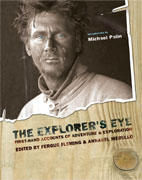The Explorer's Eye
Annabel Merullo
As a boy Michael Palin was enthralled by tales of the great explorers — set upon by cannibals or tortured by frostbite. So he just had to follow in their footsteps.
It was not until I was 12 OR 13 that I finally gave up hope of becoming an explorer. Since about the age of 8, I had been aware of a strong, and at times almost desperate, need to see parts of the world before anyone else did. I’ve never been quite sure where this urge came from, but returning to these classic accounts from the golden age of exploration reminds me. I was absolutely entranced by the tales the great explorers told. The frostbite, the gangrene, the cannibalism, the curses, the naked fear and total exhaustion, the whole panoply of horrors seemed so much more attractive than playing French cricket and drinking Horlicks.
My imagination fed greedily on accounts of appalling suffering and insane bravery, such as Captain Scott’s doomed but grippingly documented South Pole expedition, Livingstone’s defiance of death and disease to reach the towering waters of the Victoria Falls, Mallory and Irvine vanishing into a cloud 800ft from the top of Everest, never to be seen again.
On May 27, 1953, Edmund Hillary and Tenzing Norgay struggled to the top of Everest, the first people to do so. It seemed literally, the high peak of the Golden Age of exploration. After Everest most of the iconic extremes had been conquered. But it was not only that. The Everest expedition, well-financed, well-equipped and media-conscious, seemed to suggest that we had got the measure of the difficult and dangerous. Something of the mystique of exploration had gone. Technology was becoming more sophisticated, reducing both human risk and human achievement. There were great challenges left, but few of them captured the public imagination in the same way as the search for the source of the Nile or the crossing of Australia. Four years after Hillary and Tenzing’s triumph, Vivian Fuchs led the first crossing of Antarctica, but as Fergus Fleming writes: “It seemed that victory had become a non-event . . . nobody died, everything went more or less according to plan.” At the time of writing Ranulph Fiennes is doing his best to keep the traditions of exploring alive and well, setting himself ever-harder targets and ever-more punishing challenges. But the achievement of “being the First” is no longer as evocative and resounding as it once was. The fact remains that, as I had reluctantly to admit, before I was even out of short trousers, most of the world had been explored. [read more]
Exerpt from The Times

No comments:
Post a Comment